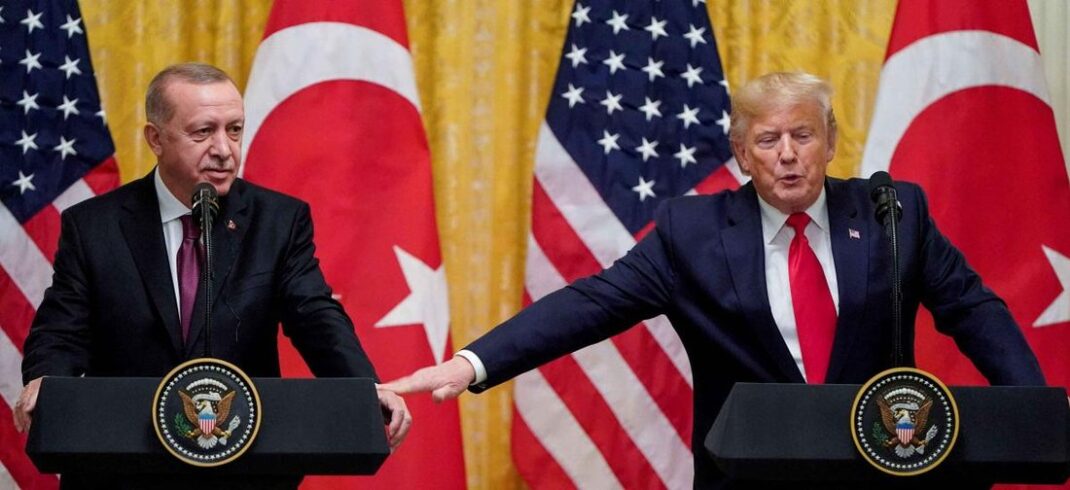
Turkish President Recep Tayyip Erdogan announced a “new era” in relations with the United States after a June 8 telephone call with US President Donald Trump. It will be anchored in Erdogan’s personal connection with Trump, and the top agenda item is Libya.
Erdogan’s “endeavor to enlist the American president as his soulmate is not solely emotional,” writes Cengiz Candar. “The military success in Libya that put Turkey on the map as the main supporter of Libya’s internationally recognized Tripoli-based Government of National Accord (GNA) heralds potential confrontation with Russia in Libya and Syria.”
“Perhaps more importantly,” Candar continues, “Turkey’s Libya adventure will put Turkey in a dangerously escalating position vis-a-vis Greece, Cyprus, France and some other EU countries.
The maritime agreement Turkey reached with the GNA in 2019 overlaps Greece’s Exclusive Economic Zone and thus considered a violation of sovereignty by Athens.
The conflict continues to escalate as Greece recently signed a maritime agreement with Italy in response to Turkey’s move.”
Turkey’s military support for the GNA in recent weeks has tipped the scales against Khalifa Hifter’s Libyan National Army, which has been backed by Egypt, the UAE and Russia.
Although Turkey initially rejected a cease-fire promoted by Egyptian President Abdel Fattah al-Sisi, writes Diego Cupolo, there are signs diplomacy still might have a chance, as Erdogan plays his cards with Trump and Russian President Vladimir Putin.
Trump spoke with Sisi on June 11, three days after his call with Erdogan, and expressed support for Sisi’s cease-fire initiative. That same day Turkish Foreign Minister Mevlut Cavusoglu called on the United States to “play a more active role in Libya, both for achieving a cease-fire and in the political process.”
With the Turkish military intervention succeeding in beating back Hifter’s forces, Russia could shift its political support to Aguila Saleh, head of the Tobruk-based House of Representatives, who may be a more favorable political interlocutor for Turkey.
“A point of convergence seems to have emerged with Russia,” explains Fehim Tastekin, “to bring the Tripoli and Tobruk forces to the negotiating table in a scenario where Hifter is excluded and thus the UAE, Egypt and France are sidelined from the game.”
Amberin Zaman observes that some in the Trump administration may consider Turkey a “counterweight’” to Russian and Iranian influence in Syria, following battles in Idlib between Turkish and Syrian forces (backed by both Russia and Iran) which began in January.
Erdogan, for his part, doesn’t see it that way, but “appears happy to encourage the belief that [Turkey] can play with Washington against Moscow, and in doing so, help level the field with Moscow when seeking accommodation with it in Syria and now Libya,” Zaman writes.
“From Syria to Libya, from the Black Sea to the Mediterranean, Erdogan now figures that Turkey needs America politically and strategically more than it did some months ago.
He learned by experience that getting the United States on board by making Trump his personal friend is easier than any other way,” Candar concludes.
Meanwhile, US-Turkey relations have stumbled on familiar issues, although probably little more than pebbles in the shoes of how Trump and Erdogan see their relationship.
On June 10, the annual State Department report on International Religious Freedom criticized Turkish policies toward its religious minorities while also detailing abuses of Syrian religious minorities, primarily Christians, by Turkish-backed Syrian opposition forces in northeast Syria, Elizabeth Hagedorn reports.
A statement by the Turkish Ministry of Foreign Affairs slammed the State Department report for its lack of objectivity and “unfounded accusations based on ambiguous sources.”
Turkey and its proxies invaded northeast Syria in October 2019 to create a “security zone” against Syrian Kurdish groups Turkey considers terrorists aligned with the Kurdistan Workers Party.
There is an issue of potentially greater consequence: A Turkish court sentenced Metin Topuz, a local employee of the US Consulate in Istanbul to nearly nine years in prison for alleged links to outlawed US-based Sunni cleric Fethullah Gulen, who Turkey considers a terrorist and blame for the attempted coup in 2016.
The US Embassy in Ankara expressed disappointment in a series of tweets about the verdict, Zaman writes, but “the reaction is markedly milder than the visa sanctions the United States had slapped on Turkey when Topuz was first arrested and speaks to the new balance that has emerged between the NATO allies.”
****
Turkey may begin new era with U.S. through Libya policy – Erdoğan
 Turkey may start a new era in its relations with the United States through common policies towards Libya, Turkish President Recep Tayyip Erdoğan said after a call with his U.S. counterpart Donald Trump.
Turkey may start a new era in its relations with the United States through common policies towards Libya, Turkish President Recep Tayyip Erdoğan said after a call with his U.S. counterpart Donald Trump.
“After talking to Trump tonight, there might be a new era in Libya. There are some issues we agreed to. I will discuss with Putin too,” Erdoğan said in an interview with state-run news channel TRT on Monday.
Turkey has provided strong military support to the internationally recognised Government of National Accord (GNA) in Libya’s capital Tripoli, backing analysts say was vital in preventing the Libya National Army (LNA) from capturing the city. Russia meanwhile has increased its support for the LNA, led by commander Khalifa Haftar.
The White House did not mention details of any common initiative for Libya agreed between Trump and Erdoğan on the call. The two leaders discussed critical bilateral and regional issues, including Libya, Syria, and the eastern Mediterranean, White House spokesperson Judd Deere told journalists.
Relations between the United States and NATO member Turkey have soured over the past two years after the latter took delivery of Russian S-400 air defence missiles and sent troops into Syria to fight Syrian Kurdish militants allied with the United States in the fight against Islamic State (ISIS).
Turning to the ongoing demonstrations in the United States over the murder of George Floyd, Erdoğan said Syrian militants linked to the outlawed Kurdistan Workers’ Party (PKK) were involved in the protests. The PKK, which has fought for Kurdish autonomy in Turkey for four decades, is recognised as a terrorist group by Turkey, the United States and European Union.
Erdoğan said Trump had not yet been briefed on documents sent by Ankara outlining the links between Syrian Kurds and the U.S.-based ANTIFA movement, a loosely organised leftist, anti-fascist group involved in the demonstrations. Trump said last week that ANTIFA would soon be declared a terrorist organisation, accusing it of exploiting the anti-racism protests.
Erdoğan’s spokesperson Fahrettin Altun shared a video on Twitter on June 6 that allegedly linked ANTIFA to the PKK. An unidentified commentator in the video said “Turkey fully supports” the decision of the U.S. government to recognise ANTIFA as a terrorist organisation.
Erdoğan said he and Trump also discussed the Gülen movement, which Turkey accuses of orchestrating a failed military coup in July 2016. Erdoğan said he shared with Trump the names of some members of the movement residing in the United States, asking him to ensure they were extradited to Turkey.
Trump would do what was necessary once he received an official list of the persons, Erdoğan said.
__________




